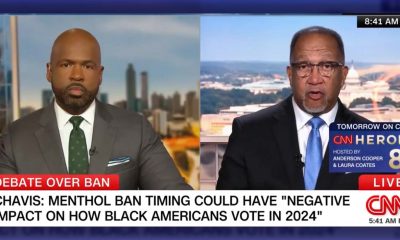National
Prosecutor: White Officer Panicked Before Shooting Black Man


Police officer Randall Kerrick, left, and defense attorney Michael Greene listen during opening arguments at the Mecklenburg County Courthouse in Charlotte. N.C., Monday, Aug. 3, 2015. Kerrick is facing voluntary manslaughter charges in the shooting death of Jonathan Ferrell. (Davie Hinshaw/The Charlotte Observer via AP, Pool)
JEFFREY COLLINS, Associated Press
CHARLOTTE, N.C. (AP) — Both sides in the voluntary manslaughter trial of a white Charlotte police officer in the on duty shooting of a black man agree bad choices led up to the man’s death as he looked for help after a car crash.
But during opening statements Monday, Michael Greene, the lawyer for Officer Randall Kerrick, said bad choices by Jonathan Ferrell caused his death, from drinking and smoking marijuana before the early morning crash to beating on a woman’s door so hard he dented it while seeking help and charging officers before they could even figure out what was wrong.
“This case is not about race. It never was about race. This case was about choices — Jonathan Ferrell’s bad choices,” Greene said.
Prosecutor Arden Harris said the bad choices were all made by Kerrick, who had his gun drawn and started shooting before taking any time to figure out what was going on.
Kerrick, 28, faces up to 11 years in prison if convicted. He was charged just hours after the September 2013 shooting, before black men died during arrests or while in custody in Ferguson, Missouri; North Charleston, South Carolina; and Baltimore, among other places, sparking a national debate on police tactics.
Testimony was expected to continue Tuesday. Jurors did see a photo of Ferrell face down in handcuffs in a pool of blood, but have not heard from the other officers on the scene and haven’t seen the video from dashboard cameras that lawyers for both sides said will support their version of events. That video has never been shown publicly.
The first witnesses called by prosecutors Monday were friends and family of Ferrell. Then prosecutors called Sarah McCartney, the mother alone with her 1-year-old child who woke up to Ferrell pounding on the door.
She opened the door for a moment, thinking it was her husband, then slammed it shut, locked it back and called police, reporting a man trying to kick in her door and break in her home. McCartney’s home alarm then began sounding and Ferrell can be heard screaming “shut it off!” as the homeowner spoke to the alarm company and the 911 operator.
“I was terrified,” McCartney said.
Ferrell, a 24-year-old former Florida A&M football player, kept kicking and hitting the door for a few minutes — so hard that he dented it, Greene said.
Kerrick and the two other officers found Ferrell a short distance away near the lighted neighborhood clubhouse. Ferrell charged the officers. At his autopsy, Ferrell’s DNA was found on Kerrick’s uniform from his neck to his feet and on the slide and trigger of the officer’s gun. Kerrick’s DNA was under Ferrell’s fingernails, Greene said.
But prosecutors said Ferrell, not thinking straight after the wreck, only started running because he feared for his life when one of the other officers said nothing before training the laser targets from his stun gun at his chest.
Ferrell fell on Kerrick after he was shot four times, not because he was attacking the officer. The eight additional shots came as Ferrell writhed and tried to crawl to escape, not as he reached for the gun, said Harris, a special deputy attorney general for the state who took over after the local district attorney said his office had a conflict trying Kerrick.
The other two officers at the scene did not shoot and were not charged.
“Who polices the police when they do wrong?” Harris asked jurors, picked in a two-week process. “You do.”
Kerrick joined the Charlotte-Mecklenburg Police Department in 2011 after working as an animal control officer.
A grand jury initially refused to indict Kerrick on the voluntary manslaughter charge in January 2014, but prosecutors sent the case back a week later because the panel was missing four members. Kerrick was then indicted.
Charlotte agreed to pay Ferrell’s family for $2.25 million earlier this year to settle a lawsuit over the shooting.
___
Follow Jeffrey Collins on Twitter at http://twitter.com/JSCollinsAP.
Copyright 2015 The Associated Press. All rights reserved. This material may not be published, broadcast, rewritten or redistributed.












































